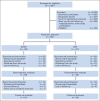Meaning-centered group psychotherapy: an effective intervention for improving psychological well-being in patients with advanced cancer
- PMID: 25646186
- PMCID: PMC4334778
- DOI: 10.1200/JCO.2014.57.2198
Meaning-centered group psychotherapy: an effective intervention for improving psychological well-being in patients with advanced cancer
Abstract
Purpose: To test the efficacy of meaning-centered group psychotherapy (MCGP) to reduce psychological distress and improve spiritual well-being in patients with advanced or terminal cancer.
Patients and methods: Patients with advanced cancer (N = 253) were randomly assigned to manualized eight-session interventions of either MCGP or supportive group psychotherapy (SGP). Patients were assessed before and after completing the treatment and 2 months after treatment. The primary outcome measures were spiritual well-being and overall quality of life, with secondary outcome measures assessing depression, hopelessness, desire for hastened death, anxiety, and physical symptom distress.
Results: Hierarchical linear models that included a priori covariates and only participants who attended ≥ three sessions indicated a significant group × time interaction for most outcome variables. Specifically, patients receiving MCGP showed significantly greater improvement in spiritual well-being and quality of life and significantly greater reductions in depression, hopelessness, desire for hastened death, and physical symptom distress compared with those receiving SGP. No group differences were observed for changes in anxiety. Analyses that included all patients, regardless of whether they attended any treatment sessions (ie, intent-to-treat analyses), and no covariates still showed significant treatment effects (ie, greater benefit for patients receiving MCGP v SGP) for quality of life, depression, and hopelessness but not for other outcome variables.
Conclusion: This large randomized controlled study provides strong support for the efficacy of MCGP as a treatment for psychological and existential or spiritual distress in patients with advanced cancer.
Trial registration: ClinicalTrials.gov NCT00494910.
© 2015 by American Society of Clinical Oncology.
Conflict of interest statement
Authors' disclosures of potential conflicts of interest are found in the article online at
Figures
Comment in
-
Reply to D. Spiegel.J Clin Oncol. 2015 Aug 20;33(24):2714-5. doi: 10.1200/JCO.2015.62.4635. Epub 2015 Jul 20. J Clin Oncol. 2015. PMID: 26195700 Free PMC article. No abstract available.
-
Existential Psychotherapy for Patients With Advanced Cancer: Facing the Future and the Past.J Clin Oncol. 2015 Aug 20;33(24):2713-4. doi: 10.1200/JCO.2015.62.2365. Epub 2015 Jul 20. J Clin Oncol. 2015. PMID: 26195719 No abstract available.
References
-
- Classen C, Butler LD, Koopman C, et al. Supportive-expressive group therapy and distress in patients with metastatic breast cancer: A randomized clinical intervention trial. Arch Gen Psychiatry. 2001;58:494–501. - PubMed
-
- Edelman S, Bell DR, Kidman AD. A group cognitive therapy programme with metastatic breast cancer patients. Psychooncology. 1999;8:295–305. - PubMed
-
- Edmonds CVI, Lockwood GA, Cunningham AJ. Psychological response to long-term group therapy: A randomized trial with metastatic breast cancer patients. Psychooncology. 1999;8:74–91. - PubMed
-
- Kissane DW, Grabsch B, Clarke DM, et al. Supportive-expressive group therapy for women with metastatic breast cancer: Survival and psychosocial outcome from a randomized controlled trial. Psychooncology. 2007;16:277–86. - PubMed
-
- Spiegel D, Bloom JR, Yalom I. Group support for patients with metastatic cancer: A randomized outcome study. Arch Gen Psychiatry. 1981;38:527–533. - PubMed
Publication types
MeSH terms
Associated data
Grants and funding
LinkOut - more resources
Full Text Sources
Other Literature Sources
Medical


